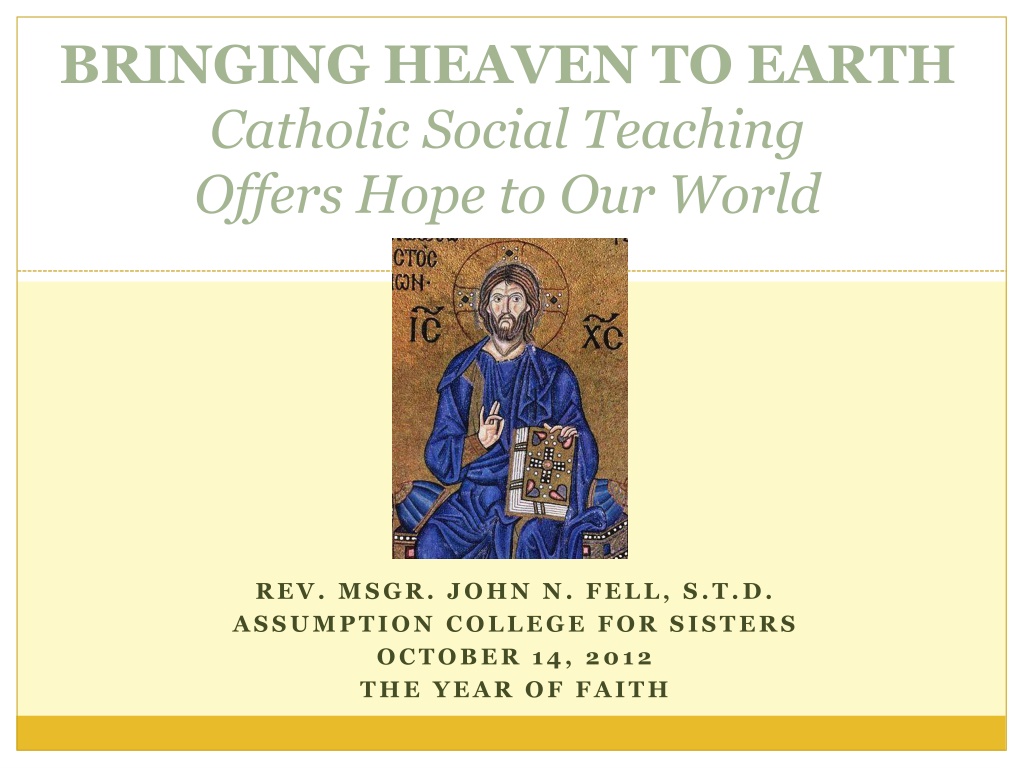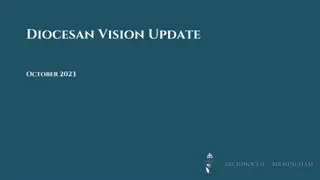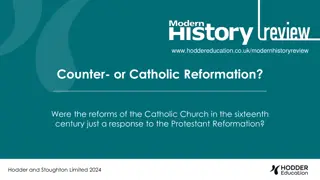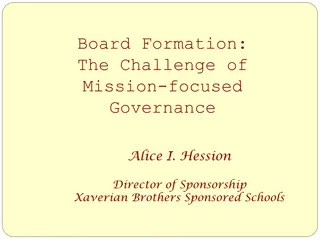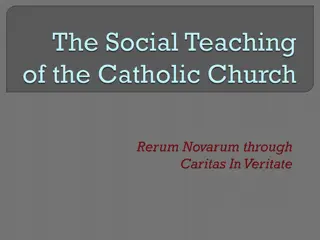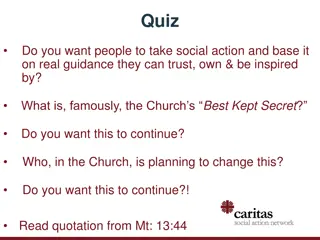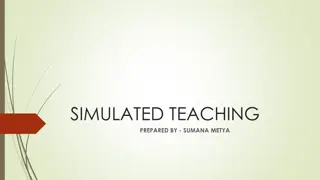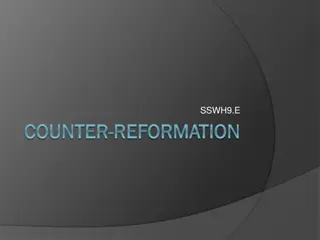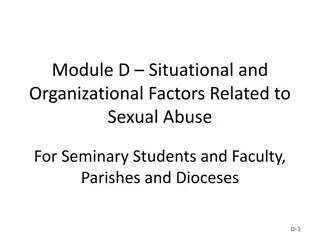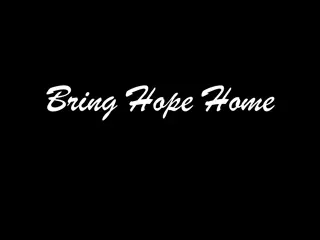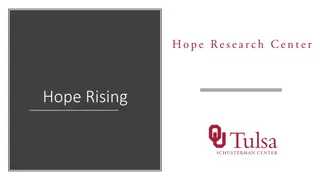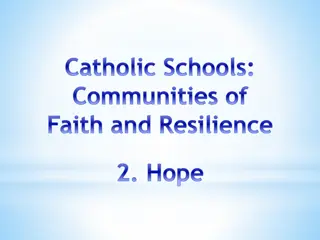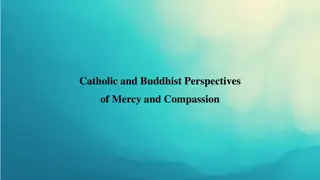Understanding Catholic Social Teaching: Bringing Hope to Our World
Catholic Social Teaching encompasses principles for reflection, judgment, and action to address social injustices and promote the common good. Rooted in the Church's interpretation of history and guided by the Holy Spirit, it calls for a transformative response to issues of justice and equality.
Download Presentation

Please find below an Image/Link to download the presentation.
The content on the website is provided AS IS for your information and personal use only. It may not be sold, licensed, or shared on other websites without obtaining consent from the author. Download presentation by click this link. If you encounter any issues during the download, it is possible that the publisher has removed the file from their server.
E N D
Presentation Transcript
BRINGING HEAVEN TO EARTH Catholic Social Teaching Offers Hope to Our World REV. MSGR. JOHN N. FELL, S.T.D. ASSUMPTION COLLEGE FOR SISTERS OCTOBER 14, 2012 THE YEAR OF FAITH
What is Catholic Social Teaching? The church s social teaching comprises a body of doctrine, which is articulated as the church interprets events in the course of history, with the assistance of the Holy Spirit, in the light of the whole of what has been revealed by Jesus Christ the church s social teaching proposes principles for reflection; it provides criteria for judgment; it gives guidance for action. (Catechism of the Catholic Church, 2422-3)
Catholic Social Teaching & Justice Justice the firm desire to each their due. Commutative (Contractual) Justice relations between equals. Distributive Justice how the greater treats the lesser. General (Legal) Justice - how the lesser treats the greater. Social Justice - a combination of the 3 above with particular emphasis on the authentic good of the individuals and groups involved; stresses the Common Good. Social Justice vs Social Charity Social Charity remediates symptoms (for example, soup kitchens, homeless shelters, clothing drives, etc.) Social Justice addresses root causes of want (for example, working to end discrimination, promoting rights of workers, changing unjust laws, etc.)
What is Catholic Social Teaching? The church makes judgments about economic and social matters when the fundamental rights of the person or the salvation of souls requires it. She is concerned with the temporal goods of men because they are ordered to the sovereign Good, their ultimate end. (Catechism of the Catholic Church, 2458) Not an alternate political/social/economic program, but an encouragement and critique of all programs.
Why should this concern us? A New Way of Thinking/Evangelizing Universal Call to Holiness Kingdom of God vs Heaven Scriptural Backup- Parable of the Rich Man and Lazarus (Luke 16:19-31). Last Judgment Scene (Matthew 25: Action on behalf of justice and participation in the transformation of the world appear to us as a constitutive dimension of the preaching of the Gospel. (US Bishops, Justice in the World, 1971)
History of Involvement Old Testament Prophets New Testament Community St. Pachomius (d. 348) St. Basil the Great (d. 379) St. John Chrysostom (d. 431) Not to enable the poor to share in our goods is to steal from them and deprive them of life. The good we possess are not ours, but theirs. (Homily about Lazarus) Ss. Vincent de Paul (d. 1660) & Louise de Marillac (d. 1660) Blessed Pauline von Mallinckrodt Pope Leo XIII (d.1903)
What is it all about? Jesus came to bring integral salvation, one which embraces the whole person and all mankind, and opens up the wondrous prospect of divine filiation. (Bl. John Paul II, Redemptoris Missio, 260)
What is it all about? Centered on the example and teaching of Jesus Christ. Who is the human person in the perspective of Jesus Christ? Rooted in everything that Jesus came to reveal about humanity God s feelings about humanity and God s expectations of humanity.
What is it all about? The Dignity of the Human Person - 1 God created man in his image; in the divine image he created him; male and female he created them. (Genesis 1:27) Oh Lord, you have probed me and you know me. You know what I said and what I stand. You understand my thoughts. My journeys and my rest you scrutinize, with all my ways you are familiar truly you have formed my innermost being; you knit me in my mother s womb. (Psalm 139)
What is it all about? The Dignity of the Human Person 2 Created by God and sharing in God s likeness. Possessing a dignity rooted in the way that God values us. Must be respected from the moment of conception. A body/soul unity. Endowed with creative, intelligent freedom. Endowed with a spiritual, eternal destiny.
7 Principles of Catholic Social Teaching 1.) The Life and Dignity of the Human Person 2.) Call to Family, Community, and Participation 3.) Rights and Responsibilities 4.) Option for the Poor and Vulnerable 5.) Dignity of Work and Rights of Workers 6.) Solidarity 7.) Care for God s Creation From Catholic Social Teaching: Challenges and Directions Reflections of the U.S. Catholic Bishops (1998)
Call to Family, Community, & Participation Slide # 1 Because of its role as the place where People freely commit to living in a loving & faithful relationship, Children are born, accepted, raised, and further integrated, Individuals are cared for, supported, and loved, the family (not the individual or the state) is the basic unit of society. The family exists prior to civil society and is its foundation and building block. All other societal institutions (for example, government, work, education, etc.) must endeavor to support and adapt to the needs of the family. Such other societal institutions must be evaluated by their influence on the family.
Call to Family, Community, & Participation Slide # 2 Families and individuals have the further right to join together in larger communities To offer and obtain mutual support, To share their values and concerns, To further their legitimate aims and interests, and To do in common what it is more difficult to do alone. Norms are legitimate to provide for the need for effective safeguarding of the rights of all citizens and for peaceful settlement of conflicts of rights, also by the need for adequate care of genuine public peace, which comes about when men live together in good order and in true justice, and finally by the need for a proper guardianship of public morality. (Catechism of the Catholic Church, 2109)
Rights & Responsibilities Slide # 1 We must speak of man's rights. Man has the right to live. He has the right to bodily integrity and to the means necessary for the proper development of life, particularly food, clothing, shelter, medical care, rest, and, finally, the necessary social services. In consequence, he has the right to be looked after in the event of ill health; disability stemming from his work; widowhood; old age; enforced unemployment; or whenever through no fault of his own he is deprived of the means of livelihood. (Bl. John XXIII, Pacem in Terris, 11).
Rights & Responsibilities Slide # 2 In human society one man's natural right gives rise to a corresponding duty in other men; the duty, that is, of recognizing and respecting that right. Every basic human right draws its authoritative force from the natural law, which confers it and attaches to it its respective duty. Hence, to claim one's rights and ignore one's duties, or only half fulfill them, is like building a house with one hand and tearing it down with the other. (Bl. John XXIII, Pacem in Terris, 30).
Rights & Responsibilities Slide # 3 A Catholic Framework for Economic Life (excerpts) All people have a right to life and to secure the basic necessities of life (e.g., food, clothing, shelter, education, health care, safe environment, economic security.) All people, to the extent they are able, have a corresponding duty to work, a responsibility to provide the needs of their families and an obligation to contribute to the broader society. Society has a moral obligation, including governmental action where necessary, to assure opportunity, meet basic human needs, and pursue justice in economic life. (USCCB, http://www.usccb.org/issues-and-action/human-life-and- dignity/economic-justice-economy/index.cfm, accessed 10/10/2012.)
Option for the Poor and Vulnerable You shall not wrong any widow or orphan. If ever you wrong them and they cry out to me, I will surely hear their cry. My wrath will flare up, and I will kill you with the sword; then your own wives will be widows, and your children orphans . . . (Exodus 22:20-24) He who shuts his ear to the cry of the poor will himself also call and not be heard. (Proverbs 21:13) Last Judgment Scene (Matthew 25:31-46) Universal Destination of Goods.
Dignity of Work & Rights of Workers Slide # 1 We ask you, brothers, to respect those who are laboring among you or who are over you in the Lord and who admonish you, and to show esteem for them with special love on account of their work. Be at peace among yourselves. (1 Thessalonians 5:12-14) Human Work A Means to Make a Living A Means to Participate in Society and Co-create the Future with God Leo XIII Must constantly apply the Gospel to the current situation.
Dignity of Work & Rights of Workers Slide # 2 Rights of Workers Just Wage The just wage is the legitimate fruit of work a salary is the instrument that permits the laborer to gain access to the goods of the earth. Remuneration for labor is to be such that man may be furnished the means to cultivate worthily his own material, social, cultural, and spiritual life and that of his dependents . . the simple agreement between employee and employer with regard to the amount of pay to be received is not sufficient for the agreed-upon salary to qualify as a just wage (Compendium of the Social Doctrine of the Church, 302-3). Rest Environment not unsuitable to physical or moral health No assault to personal dignity or integrity Appropriate subsidies when unemployed. Pension and Insurance for sickness, old age, work- related injuries Security with regard to maternity Assemble and form associations; unions; just union action.
Dignity of Work & Rights of Workers Slide # 3 When progressing toward the integral good of the human person, labor and capital must strive to be in harmony. The dignity of the worker must never be forgotten, nor the duty of the worker to contribute to the common good.
Solidarity Slide # 1 Solidarity highlights in a particular way, the intrinsic social nature of the human person, the equality of all in dignity and rights and the common path of individuals and peoples towards an ever more committed unity. (Compendium of the Social Doctrine of the Church, 192) The new relationships of interdependence between individuals and peoples, which are de facto forms of solidarity, have to be transformed into relationships tending toward genuine ethical-social solidarity. This is a moral requirement inherent within all human relationships. (Comp. of the Social Doctrine of the Church, 192)
Solidarity Slide # 2 Solidarity must be seen above all in its value as a moral virtue that determines the order of institutions. On the basis of this principle the structures of sin that dominate relationships between individuals and peoples must be overcome. (Compendium of the Social Doctrine of the Church, 193) Solidarity is also an authentic moral virtue, not a feeling of vague compassion or shallow distress at the misfortunes of so many people, both near and far. On the contrary, it is a firm and persevering determination to commit oneself to the common good. That is to say the good of all, and of each individual, because we are all really responsible for all. (Compendium of the Social Doctrine of the Church, 193)
Care for Gods Creation Slide # 1 African proverb our world is not bequeathed to us by our parents, it is loaned to us by our children! The dominion granted by the Creator over the material, vegetable, and animal resources of the universe cannot be separated from respect for moral obligations, including those for generations to come. (Catechism of the Catholic Church, 2456) a central point of reference for every scientific and technological application is respect for men and women, which must also be accompanied by a necessary attitude of respect for other living creatures. (Compendium of the Social Doctrine of the Church, 459)
Care for Gods Creation Slide # 2 Care for the environment represents a challenge for all of humanity. It is a matter of a common and universal duty, that of respecting our common good, destined for all, by preventing anyone from using with impunity the different categories of beings, whether living or inanimate animals, plants, the natural elements simply as one wishes, according to one s own economic needs. (Compendium of the Social Doctrine of the Church, 466)
In the end . . . 3 Principal Guiding Questions How does this effect the human person? How does this effect the family? How does this effect the least among us? Further reflection Which person, which family, which poor people? ANS. Those most directly involved.
When does human life begin? Major textbooks on embryology: (Moore/Persaud): Human development begins at fertilization . . . The highly specialized, totipotent cell marked the beginning of each of us as a human person. (Carlson): The time of fertilization represents the starting point in the life history . . . of the individual. (O Rahilly/ Muller): Although life is a continuous process, fertilization is a critical landmark because, under ordinary circumstances, a new, genetically distinct human organism is thereby formed . . . The embryo now exists as a genetic unity.
The COMMON GOOD The COMMON GOOD is the sum of those conditions of social life, which allow social groups and their individual members relatively thorough and ready access to their fulfillment. (GS, 26). The common good includes (1) respect for persons, (2) social well-being and development, and (3) peace.
WHO? ALL OF US! Preach the word, be urgent in season and out of season, convince, rebuke, and exhort, be unfailing in patience and in teaching. For the time is coming when people will not endure sound teaching, but having itchy ears, they will accumulate for themselves teachers to suit their own likings, and will turn away from listening to the truth and wander into myths. As for you, always be steady, endure suffering, do the work of an evangelist, fulfill your ministry. (2 Timothy 4:2-5)
